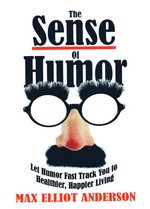 The Sense Of Humor: Let Humor Fast Track You to Healthier, Happier Living
The Sense Of Humor: Let Humor Fast Track You to Healthier, Happier Living
by Max Elliot Anderson
Paperback, 330 pg.
Elk Lake Publishing, 2016
Read: February 15 – 22, 2017

E. B. White famously said, “Analyzing humor is like dissecting a frog. Few people are interested and the frog dies of it.” And I’ve found no exceptions to this in the couple of decades I’ve looked. Nevertheless, when Anderson asked if I’d read the book, I said yes. Sadly, White’s quip contains more meat than Anderson’s 330 pages.
The central thesis of the book is that humor and laughter are good mentally, physically, socially and spiritually. I’m pretty sure most people know that (at least with most of these things) without Anderson’s help. That doesn’t stop him from saying it over and over again — almost every time, it’s like he hasn’t said it before. As it’s such a benefit, he argues, we need to increase our use of it in our family, relationships, professional life, etc. A time or two, he adds a vaguely Christian-ish gloss to this to add some weight to his argument, but those attempts are pretty weak and best ignored for the author’s sake.
His use of sources is laughable — there are no footnotes/endnotes, many of his citations come in the form of “one entertainer said, . . . “, his history is easily demonstrably wrong. In short, the writing is shoddy and in dire need of a capable editing — which would make the whole thing a lot shorter.
The humor used to tell his point? Well, it’s mildly amusing at best. His chapter “Humor that is No Laughing Matter” is basically a narrow-minded nag-fest about sticking to types of humor that Anderson has arbitrarily decided is appropriate and avoiding humor that he doesn’t like. Everything else is just dull. Overall, the tone and content of the book don’t match up to the subject matter.
This would have made a fairly benign and marginally interesting magazine article, or TL;DR blog post — but as a book? Nope, it just doesn’t work — it ends up spreading what material there is too thin to be any good. It’s too filled with what everyone already knows (and repeats it) and shoddy writing to waste your time with.
Disclaimer: I received a copy of this book from the author in exchange for my honest thoughts, I think it’s pretty clear that it didn’t bias me toward the book.
—–



Read Irresponsibly, but please Comment Responsibly